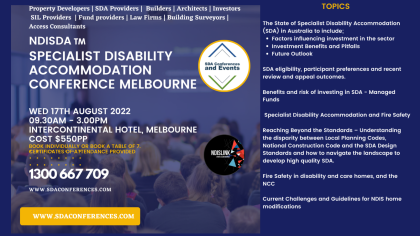The State of Specialist Disability Accommodation (SDA) in Australia includes:
• Factors influencing investment in the sector
• Investment Benefits and Pitfalls
• Future Outlook
SDA eligibility, participant preferences and recent review and appeal outcomes.
Eligibility
• The 2 SDA Eligibility criteria – what they have in common – what distinguishes them – examples• The SDA needs requirement – how it works
Preferences and recent outcomes
• Participants’ preferences as to building types – which includes living arrangements preferences – numbers of bedrooms etc. • What weight attaches to preferences?• What’s happening around this? Recent AAT decisions.• Preferences and the Article 19 of The United Nations Convention on the Rights of Persons with Disabilities Challenges and Guidelines for NDIS home modifications
This presentation will discuss; • Different types of home modifications (Adaptation, Minor, Complex)
• What is not covered under the NDIS
• Approval process for CHM home modifications;
a) Plan approval
b) Assessment
c) Final steps
Specialist Disability Accommodation and fire safety
People with disabilities are overrepresented in fatal home fire statistics. For people living independently, fire safety is a shared responsibility between individuals, the people that provide support for them at home and the fire services. Angela Cook (Country Fire Authority, CFA) and Geoff Kaandorp (Fire Rescue Victoria, FRV) will discuss the importance of home fire safety for people with disabilities, and the simple steps that everyone can take to be more fire safe in their home.
Reaching Beyond the Standards – Understanding the disparity between Local Planning Codes, National Construction Code and the SDA Design Standards and how to navigate the landscape to develop high-quality SDA.
Currently, Local Planning Codes do not have the flexibility and understanding to handle Multi-residential SDA Developments. These are not Residential Care facilities, Community Residences or Respite centres. There needs to be a mechanism that will permit council approval while also allowing ownership of apartments/ townhouses/ duplex.
Compliance with National Construction Code is not always simple either, items such as ‘flush thresholds’ require performance solutions to deviate from the acceptable solutions under the NCC. Not to mention the mandates from Private Certifiers/Surveyors to develop Multi-Residential SDA under Class 3 to mitigate fire evacuation risks. In this session, David will discuss:
- Common misconceptions around multi-residential SDS and town planning schemes
- Performances solutions around SDA Design Standards and the National Construction Code
- What in this market is considered ‘Industry Best Practice’
Benefits and risk of investing in SDA - Managed Funds
This presentation will include;
• A summary of key sector traits, investment characteristics, key roles, emerging trends, risks and future outlook• A summary of the types of investment into SDA broadly available to the market (direct, sleeve, portfolio) along with a description of each and key risks/benefits.• A case study of successes and failures• A background on the structure, strategy and methodologies of the Australian Unity SDA Fund
Fire Safety in disability and care homes, and the NCC
While the National Construction Code (NCC) would suggest that such properties should be classified as Class 3 (hostels) or Class 9c (residential care), often they are being built as Class 1a (single detached dwelling) or Class 1b (boarding house) buildings. Such properties would be fine for disabled residents who are capable of self-care, but often they are used for people who need full-time support. Unfortunately, these Class 1a and 1b buildings have inadequate fire protection to cater for people who require assistance for dull-time care.
The use of these building classes for disability care can place individuals at risk and is potentially breaching the requirements of providers under NDIS rules. Daniel will present on the current approaches to home care, and recommend changes that should be considered to protect people with disabilities.
For more details please see www.sdaconferences.com or call 1300 667 709
For Speaker BIO's please see www.sdaconferences.com.



